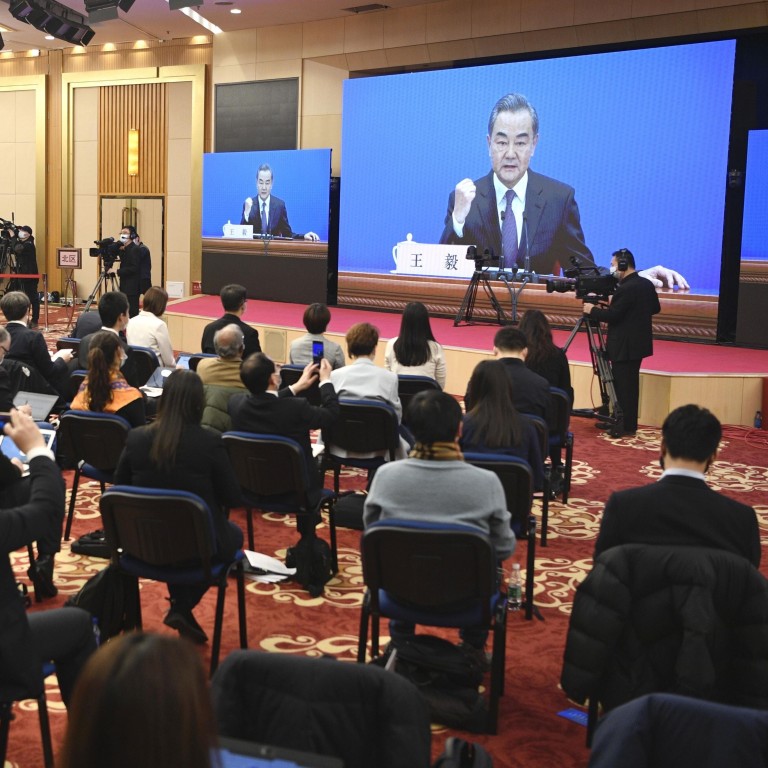
China will live up to its word on EU investment treaty: foreign minister
- Wang Yi says China backs European Union playing a bigger role in global affairs
- But issues around labour rights and forced labour are causing a backlash from EU parliamentarians
At a press conference on the sidelines of the National People’s Congress, Wang played up the prospects of cooperating with Brussels, saying both sides should work together to tackle global challenges. He pledged Beijing’s support for the EU – which is seeking more strategic autonomy – to have a bigger global influence,
“China and the EU are two important powers in a multipolar world. Bilateral relations are equal and open, they do not target a third party, nor are they subject to a third party. Therefore, the question of China hoping to divide US-European relations does not exist,” he said.
“Meanwhile, China is willing to see the EU strengthen its strategic autonomy, uphold multilateralism and devote to major power coordination and cooperation.
“I’d like to repeat that China will continue to support the European integration process, back the EU’s solidarity and self-improvement and stand by the EU in playing a bigger role on global affairs.”
During the press conference on Sunday, Wang highlighted how China had achieved diplomatic success in the past year by Chinese President Xi Jinping actively reaching out to foreign leaders under what he called “heads of states diplomacy” in spite of Covid-19 imposed travel restrictions. Wang praised the “amicable relationship” between Xi and EU leaders.
How China’s foreign policy priorities could change in post-pandemic world
Without going into details, the foreign minister also outlined China’s contributions to issues such as climate change, reforms of the United Nations and World Trade Organization, and the Middle East – all priority issues for Brussels.
Wang stressed that China would live up to its words.
“I can tell you clearly that China is committed to fulfilling every commitment in the deal, including efforts to sign related items of international labour conventions,” Wang said at the press conference.
“We also believe the European side is able to deliver all commitments in the agreement.”
Beijing has reached out to European leaders as its relations with Washington have plunged since last year and there have been no signs of improvement under US President Joe Biden’s administration.
But China-EU tensions have simmered in recent years after Brussels accused Beijing of playing a game of divide and conquer by pushing the agenda of a cooperation platform with central and eastern European countries.
Note: optional trim for print begins:
The Biden administration is on track to restore the impaired transatlantic alliance, which observers have warned would renew pressure on China.
In a major shift on its China policy two years ago, the EU defined China as “a negotiating partner with whom the EU needs to find a balance of interests, an economic competitor in the pursuit of technological leadership and a systemic rival promoting alternative models of governance”.
But China has repeatedly pushed back against the “systemic rival” label. Instead, it has underscored that both sides share common interests and praised strategic autonomy by the European side.
Wang said China was ready to work with the EU to get the coronavirus pandemic under control, power up the global economic recovery and address climate change.
“The two great cultures can hold dialogues and communications. We are not systemic rivals. China and the EU independently carry out cooperation on our own, which are enabling us to achieve great deeds,” Wang said.
US military spending way out of proportion
Last year, China overtook the US as the European Union’s largest trading partner. Wang said the investment deal and a 2019 bilateral agreement stepping up intellectual property protection of each other’s branded agricultural products were in line with the shared needs of the two sides and “do not only benefit one side”.
“China and the EU share a wide range of interests. Cooperation and mutual benefit are the main themes of our bilateral relations,” Wang said.

